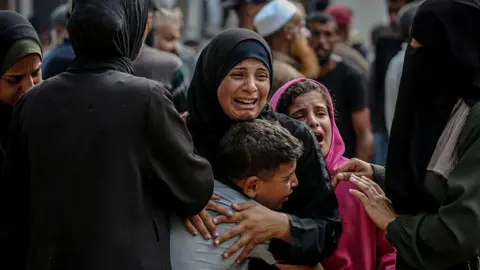UN Chief Calls Gaza Famine a “Failure of Humanity”
The situation in Gaza City has reached catastrophic levels, with the United Nations Secretary-General António Guterres deeming the confirmed famine in the region a “failure of humanity.” Guterres referred to the crisis as a “man-made disaster” following a report from the Integrated Food Security Phase Classification (IPC), which escalated the food insecurity status in parts of Gaza to Phase 5, the most severe level.
According to the IPC, over half a million individuals in Gaza are enduring conditions described as “catastrophic,” marked by severe starvation and suffering. Israel’s government has outrightly rejected the claims of widespread starvation, asserting no such conditions prevail in the territory.
Aid Restrictions and Humanitarian Crisis
The United Nations has accused Israel of incessantly limiting aid supplies entering Gaza, a statement that the Israeli government has countered. This denial stands in stark contrast to the assertions made by over 100 humanitarian organizations, firsthand witnesses, various UN entities, and some of Israel’s allies, including the United Kingdom.
The IPC emphasizes the urgent need for a comprehensive and immediate response to avert further escalation in famine-related fatalities. It forecasts that by the end of September, the famine conditions may extend across the region to places like Deir al-Balah and Khan Younis, impacting approximately a third of the population, totaling nearly 641,000 people.
The report also alerts that by June 2026, around 132,000 children under five years of age may face severe malnutrition. Since hostilities began, the health ministry in Hamas-controlled Gaza has reported 271 deaths attributable to malnutrition, with 112 of those being children.
| Indicator | Phase 4 (Emergency) | Phase 5 (Catastrophic) |
|---|---|---|
| Estimated Affected Population | 1.14 million (58% of population) | 641,000 |
| Children Under Five at Risk | N/A | 132,000 |
| Reported Malnutrition Deaths | N/A | 271 (112 children) |
Personal Accounts and International Response
Personal testimonials from those enduring the famine paint a grim picture. Reem Tawfiq Khader, a mother of five from Gaza City, remarked on the delayed declaration of famine, emphasizing the dire scarcity of food. “We haven’t eaten any protein for five months. My youngest child is four years old—he has never seen a fruit or vegetable,” she shared.
Another resident, Rida Hijjeh, expressed concern for her daughter Lamia, whose weight plummeted dramatically from 19 kg to just 10.5 kg. “This all happened only because of the famine,” Rida lamented. “There is simply nothing for the child to eat.”
UN aid officials echo the sentiment that the famine is preventable, attributing it to systematic barriers imposed by Israel that restrict food access to Palestinians. Meanwhile, British Foreign Secretary David Lammy described the unfolding famine as a “moral outrage” and criticized Israel’s restriction of humanitarian aid.
In contrast, Israeli Prime Minister Benjamin Netanyahu defended the country’s actions, stating, “Israel does not have a policy of starvation; it has a policy of preventing starvation,” claiming that over two million tons of aid have entered Gaza since the onset of the war.
Calls for International Action
The situation in Gaza continues to draw international scrutiny and condemnation as humanitarian groups describe the aid currently reaching the area as grossly inadequate. The UN has reported that only about 300 aid trucks enter Gaza daily, while the required number to stave off severe starvation is estimated at 600 trucks.
As Israel embarks on a new military operation aimed at further securing Gaza City, the plight of the region’s overwhelmed and displaced population remains critical. The ongoing conflict, which began with a Hamas-led assault on Israel in October 2023, has led to over 62,000 deaths in Gaza, illustrating the dire consequences of the humanitarian crisis that unfolds amidst ongoing violence.


